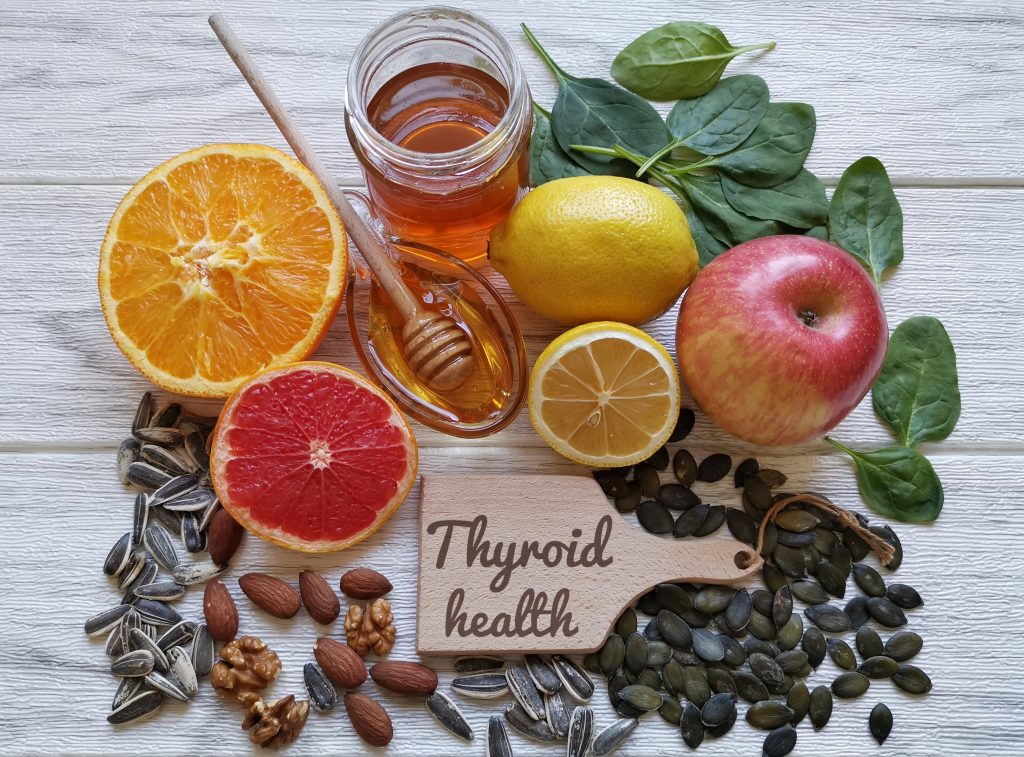

Are you constantly tired and have brain fog? Is your hair falling out and your skin dry and itchy? Are you experiencing mood swings or unusual bouts of depression?
You’re not going crazy. It’s not all in your head.
You may be experiencing symptoms of hypothyroidism, when your thyroid glands ceases to function enough.
With hypothyroidism, your thyroid gland essentially switches into “low power mode” and can’t keep up with the other regular functions of your body.
The good news is, you can support your thyroid and reverse your hypothyroidism symptoms by working with a functional medicine doctor and adopting a hypothyroidism diet plan.
The butterfly-shaped gland located at the base of your neck is known as the thyroid. This gland produces hormones that affect just about every other organ in your body.
Sometimes the thyroid hormones in the body become low, and a hormone known as TSH acts as a signal to tell the thyroid gland to produce more hormone, a condition often addressed through comprehensive hypothyroidism treatment.
However, people with hypothyroidism have low thyroid hormone levels—no matter how much TSH signals the gland to keep producing hormones.
Symptoms of hypothyroidism include:
If you have hypothyroidism, your thyroid gland is essentially underactive. Chronic autoimmune thyroiditis—also known as Hashimoto’s thyroiditis—is an autoimmune disease that often causes hypothyroidism. If someone has this autoimmune disease, his or her body attacks the thyroid and prevents it from properly producing thyroid hormone.
Other causes of hypothyroidism include:
When most people seek help for hypothyroidism, they’re prescribed medication or treated with thyroid replacement medication.
The problem is, many of these conventional treatments address the symptoms—not the root cause—of hypothyroidism. Traditional healthcare views the body as a jumble of separate systems instead of one unified system that operates together.
Many people have sought out alternative treatments for hypothyroidism, including functional medicine.
At Five Journeys, we adopt a functional approach to treating hypothyroidism. Instead of treating your surface-level symptoms, we dig deeper.
You are a unique being, and your health is affected by every aspect of your life—from what you eat to who you spend time with.
With functional treatment, we help you get to the root of your health issues once and for all. This looks like digging into your current health situation, examining your health history, and conducting in-depth testing. Then we come up with a treatment plan for your unique body.
When it comes to treating hypothyroidism (and any health condition), the Five Journeys team often starts with dietary changes. Many of us are eating foods that don’t leave us feeling good. That’s why it’s important to consider hypothyroidism diet changes when it comes to restoring thyroid function and getting back to living a full life.
Scientific research shows that dietary changes benefit those with hypothyroidism. For someone with hypothyroidism caused by Hashimoto’s disease, eating certain foods (and avoiding others) leads to thyroid improvements, weight stabilization, and overall lessened symptoms.
Certain vitamins and nutrients found in specific foods are especially beneficial for people with hypothyroidism. They can help improve symptoms such as anxiety, low mood, fatigue, and more.
Eating foods that nourish both body and soul is good for all of us, but especially for those with hypothyroidism.
There are several specific nutrients ideal for thyroid health and essential for a successful hypothyroidism diet.
This mineral shields the thyroid from oxidative stress damage and improves overall function. A selenium supplement may be considered by your functional medicine doctor, but certain foods also contain selenium.
This mineral helps with thyroid hormone production and is a major factor behind hypothyroidism. Too little iodine often results in people developing hypothyroidism.
However, too much iodine is also harmful to your health. That’s why it’s important to work with a healthcare professional like a functional medicine provider.
Iodine-rich foods include:
The body can only get iodine from outside sources, so a hypothyroidism diet that incorporates iodine is a must
This mineral is beneficial for overall immune health, but it’s especially important for proper thyroid function.
Foods that contain zinc include:
Zinc supplements have been shown to improve thyroid health along a hypothyroidism diet containing zinc. The functional medicine doctors and registered dieticians and Five Journeys can help you determine a meal plan and supplement regimen that’s perfect for you.
Ready to get started with functional medicine and find complete healing from the inside out? Five Journeys supports individuals with hypothyroidism through lifestyle coaching, hypothyroidism diet support, gut health analysis, overall detox, and more.
Book a free discovery call to get connected and learn more about how we can serve you.
Get free shipping.
Free Shipping
5% Discount


At home.
Blood and Urine
$179 – $439
Depending on insurance coverage.


This is a comprehensive stool test that relies on quantitative polymerase chain
reaction (qPCR) technology to detect parasites, bacteria, H. pylori, fungi, and more by targeting the specific DNA of the organisms tested. Click here for more information.
At home.
Stool
$399
Depending on insurance coverage.


At home.
Urine
$129
Depending on insurance coverage.


At home.
Swab
$299
Depending on insurance coverage.


At home or in lab.
Blood
$999
Depending on insurance coverage.


At home.
Blood, Urine, or Ticks
may have a $200 copay
Covered by most insurance.


At home.
Urine
$300
Depending on insurance coverage.


At home.
Urine
$199
Depending on insurance coverage.


This test evaluates the genetic profile for multiple health indicators. Click here for more information.
At home
Blood Spot


At Home
Urine
$699
Fully covered by Medicare. Repeat test prices $249


$85-$225 depending on insurance coverage.




This company can test for lyme, babesia, bartonella and additional tick-borne illnesses. Click here for more information.
Blood
around $1600 (depends on panel selected)


This test is designed to look at food sensitivities (IgG immune responses). It is available in both a 99 or 184 panel. Click here for more information.
Blood
$129-238


No insurance coverage


Blood




This test evaluates the gut function and indicates microbiome balance, overgrowth, infection, inflammation, parasites and digestive efficacy. Click here for more information.
$179-$439 depending on insurance coverage.


This test evaluates many measures including micronutrients, antioxidants, minerals, detox, overview of gut function, omegas and toxic exposure. Click here for more information.
At home.
Urine
$150 – $329


Blood work for blood count, urinalysis and vitamin levels.
At any Quest Diagnostics Location
Blood
You often have to fast for these tests-please check your providers notes.




$310